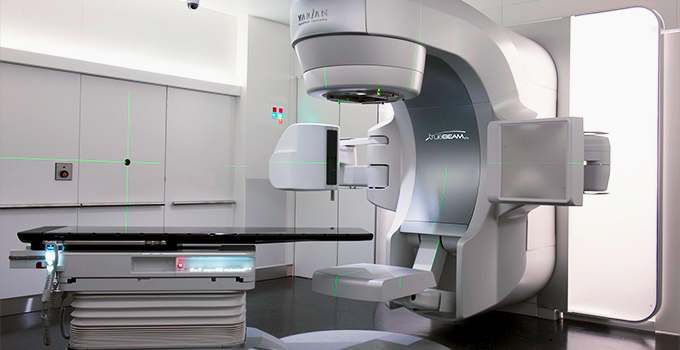OICR Investigator-led phase II clinical trial shows long-term advantage of ablative therapy for patients with multiple tumours. Technology enters phase III clinical testing.
For a long time, if a cancer had spread to another part of a patient’s body, it was thought to be incurable. Dr. David Palma and collaborators are challenging this notion.
In the phase II SABR-COMET clinical trial, Palma and colleagues evaluated the long-term effects of a modern type of radiotherapy, called stereotactic ablative radiotherapy (SABR), on individuals with cancers that have spread to a few organs. The results from the trial, which were recently published in the Journal of Clinical Oncology, show that SABR can extend the lives of these patients by a median of 22 months with an improvement in five-year survival of 25 per cent.

“The magnitude in benefit is greater than we thought and we’re very excited by the results,” says Palma, who is a Radiation Oncologist at the London Health Sciences Centre, OICR Investigator and lead of the study. “Our early results from the trial showed that there was some benefit to using SABR but our recent results are even more encouraging. The median benefit was a 22-month improvement in overall survival. That means this treatment can provide patients with more time to enjoy life.”
SABR is a modern type of radiation therapy that delivers a strong dose of radiation to tumours while avoiding healthy tissues with greater precision than traditional radiotherapy methods. SABR treatments are usually shorter and require fewer visits to the hospital relative to traditional radiotherapy, but the long-term benefits of SABR had never been demonstrated before this trial.
As SABR-COMET has matured, Palma and collaborators have launched two new phase III trials to evaluate the impact of SABR. SABR-COMET-3 is evaluating the impact of SABR on patients with one to three cancer spots in their body, whereas SABR-COMET-10 is focusing on patients with four to 10 spots. Both of these trials will study a larger group of patients and will help the community, including patients and their care providers, decide on a course of treatment with confidence.
“The first patient enrolled in SABR-COMET back in 2012 is still well today,” says Palma. “Although we still need phase III trial results to confidently recommend this treatment, our patients’ stories are powerful – and incredibly motivating.”
Read more about this work on The ASCO Post.

